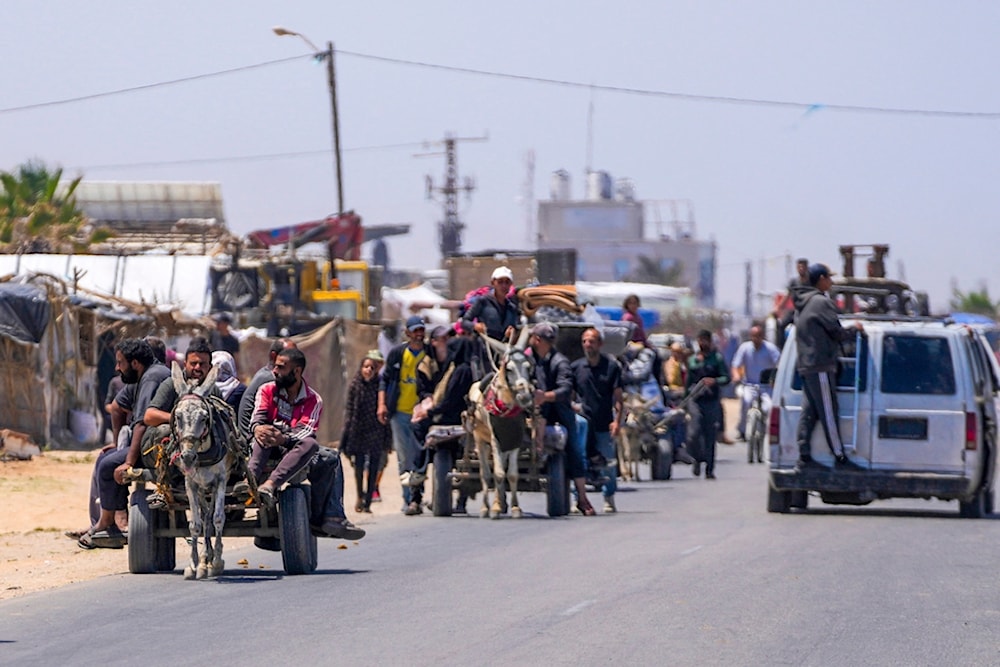Palestinian Nakba rewritten amid 'Israel's' genocide in Gaza: Amnesty
Amnesty International details how the displacement of Palestinians due to the Israeli war in Gaza reflects the 1948 Palestinian Nakba, on its 76th anniversary.
-

Displaced Palestinians arrive in central Gaza after fleeing from the southern Gaza city of Rafah in Deir al Balah, on May 9, 2024 (AP)
Amnesty International said that the 1948 Palestinian Nakba was rewriting itself on its 76th anniversary, amid the forced displacement of the people of Gaza, who have had to flee their homes and locations several times since October due to the Israeli aggression targeting the entirety of the Gaza Strip.
In a statement, the international organization said that the forced displacement of almost 2 million Palestinians, alongside the Israeli destruction of Gazan civilian property and infrastructure highlights the occupation's "appalling" history of displacing the people of Palestine while simultaneously neglecting their right of return for 76 years.
Nakba Day commemorates the Palestinian Nakba of 1948, when "Israel" ethnically cleansed at least 800,000 Palestinians from their homes and lands. Amnesty drew parallels to the forced displacement of at least 150,000 Palestinians who fled Rafah in recent days due to its invasion by Israeli occupation forces (IOF). It also emphasized that most of those currently escaping Rafah have been displaced several times since October.
In 1967, Palestinians were also forced to flee Gaza and the occupied West Bank when "Israel" occupied their lands and displaced over 350,000 of them.
Harrowing to see the chilling scenes of 1948 Nakba
Erika Guevara Rosas, the Senior Director for Research, Advocacy, Policy and Campaigns at Amnesty International, said "It is utterly harrowing to see the chilling scenes of 1948 Nakba, as it is known to Palestinians, repeat themselves as droves of Palestinians in Gaza are forced to flee their homes on foot in search of safety over and over, and Israeli army and state-backed settlers expel Palestinians in the West Bank from their homes.”
She also highlighted the trauma impacting generations of Palestinians who have been consistently uprooted and displaced while "Israel" denies them their right to return. Amnesty said the occupation's apartheid system is deeply rooted in its denial of Palestinians' right to return, right to their possessions, lands, and homes.
The organization further emphasized that Nakba Day this year is coupled with not only the dispossession or displacement of Palestinians but also the warmongering of "Israel" in the Gaza Strip amid the genocide of Palestinians and the manmade famine the occupation has imposed while systematically denying life-saving humanitarian aid entries into Gaza.
“Israel’s decades-long denial of the Palestinians’ right of return is one of the root causes of the conflict, and the escalation in violence of the past seven months shows that it must no longer be overlooked. A sustainable and just solution to this conflict must uphold human rights, including Palestinians’ right to return, and secure justice and reparation for victims of violations of international law,” Guevara said.
The Silent Nakba
On May 9, Israeli occupation forces demolished 47 homes belonging to the Abu Asa bedouin family in the Palestinian desert of al-Naqab, leaving them in permanent exile.
The supreme Arab guidance committee of the region stated that Israeli occupation forces had planned road closures in the area early in the morning to prevent protests. According to the committee, this demolition marks the largest single-day home demolition operation in decades.
The Bedouin groups residing in al-Naqab are traditional Arab tribes with a history of cultivating the land dating back to the 16th century.
A report by The Guardian, published on April 17, showed that the Israeli occupation approved thousands of house construction projects in the east part of occupied al-Quds, as it continues expediting the building of settlements over occupied lands.
The settlement projects are sponsored by governmental ministries and offices, with links tied to right-wing extremist groups that have made their goal of forcing Palestinians out clear.
Sari Kronish, from the Israeli human rights organization Bimkom – Planners for Planning Rights, said that since October 7, ministerial offices had downsized their operations, all but planning authorities, which kept spawning projects for the government to approve at an "unparalleled" rate.
The settlement in eastern al-Quds was the first to be approved in over a decade and is speculated to intentionally obstruct the possibility of instating an independent Palestinian state as the "two-state solution" gains momentum due to the war on Gaza.
An expansion of the "Kidmat Zion" settlement in the Palestinian Ras al-Amud neighborhood has also been approved.
Ahmad Salman, 71, said, “Our family has been here for 250 years … Now I have a black hole in my heart because I can’t see how my children and grandchildren can spend their lives here.”
He also stated that the municipality has been neglecting Palestinian demands, even more blatantly since the occupation launched its war on Gaza, noting that appeals have been submitted but in vain.
Read more: Israeli cabinet allocates $20Mln for illegal settlement infrastructure

 5 Min Read
5 Min Read








